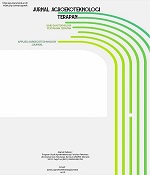PEST CONTROL BROWN PLATHOPPER (Nilaparvata lugens) USE of botanical PESTICIDES IN RICE PLANTSRICE (Oryza sativa L.)
DOI:
https://doi.org/10.35791/jat.v2i1.34064Abstract
Rice is one of the food plants that is important for the people of Indonesia to meet the need for carbohydrates. This food has a high content of carbohydrates as much as 73 g and protein as much as 8 g in every 100 g of material. As the main food crop, the sustainability of its production is needed so that the quality and quantity remain available. The obstacles often faced by farmers in efforts to increase rice production, namely the presence of plant pests (OPT). One of the OPT inland production of rice plants is a plant pest, which can cause interference in rice plants physically. Plant pests can be insects, mites, rodents, stem borers, snails, brown planthopper, green leafhopper, birds, or mollusks.
Keywords =Â Â Â Â Â Rice; Nilaparvata lugens.
Â
Abstrak
Padi merupakan salah satu tanaman pangan penting bagi masyarakat Indonesia untuk mencukupi kebutuhan akan karbohidrat. Bahan pangan ini memiliki kandungan karbohidrat sebanyak 73 g dan protein sebanyak 8 g dalam setiap 100 g bahan. Sebagai tanaman pangan utama, kesinambungan produksinya sangat dibutuhkan agar kualitas dan kuantitasnya tetap tersedia. Kendala yang sering dihadapi oleh petani dalam usaha peningkatan produksi padi yaitu adanya organisme pengganggu tanaman (OPT). Salah satu OPT di lahan produksi tanaman padi adalah hama tanaman, yang dapat menimbulkan gangguan pada tanaman padi secara fisik. Hama tanaman dapat berupa serangga, tungau, tikus, penggerek batang, keong mas, wereng coklat,wereng hijau , burung atau moluska.
Kata kunci= Â Â Â Â padi; Â Nilaparvata lugens.
Downloads
Published
How to Cite
Issue
Section
License

This work is licensed under a Creative Commons Attribution-NonCommercial 4.0 International License.





















